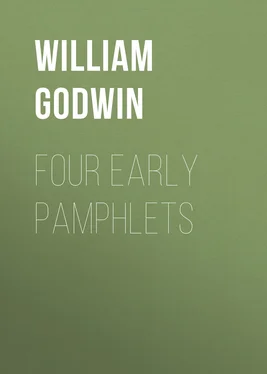William Godwin - Four Early Pamphlets
Здесь есть возможность читать онлайн «William Godwin - Four Early Pamphlets» — ознакомительный отрывок электронной книги совершенно бесплатно, а после прочтения отрывка купить полную версию. В некоторых случаях можно слушать аудио, скачать через торрент в формате fb2 и присутствует краткое содержание. Жанр: foreign_prose, Европейская старинная литература, на английском языке. Описание произведения, (предисловие) а так же отзывы посетителей доступны на портале библиотеки ЛибКат.
- Название:Four Early Pamphlets
- Автор:
- Жанр:
- Год:неизвестен
- ISBN:нет данных
- Рейтинг книги:4 / 5. Голосов: 1
-
Избранное:Добавить в избранное
- Отзывы:
-
Ваша оценка:
- 80
- 1
- 2
- 3
- 4
- 5
Four Early Pamphlets: краткое содержание, описание и аннотация
Предлагаем к чтению аннотацию, описание, краткое содержание или предисловие (зависит от того, что написал сам автор книги «Four Early Pamphlets»). Если вы не нашли необходимую информацию о книге — напишите в комментариях, мы постараемся отыскать её.
Four Early Pamphlets — читать онлайн ознакомительный отрывок
Ниже представлен текст книги, разбитый по страницам. Система сохранения места последней прочитанной страницы, позволяет с удобством читать онлайн бесплатно книгу «Four Early Pamphlets», без необходимости каждый раз заново искать на чём Вы остановились. Поставьте закладку, и сможете в любой момент перейти на страницу, на которой закончили чтение.
Интервал:
Закладка:
Too much perhaps cannot be said in their praise. They have nearly engrossed the confidence of every friend of liberty. They are the only men, whose principles were never darkened with the cloud of suspicion. What, let me ask, has been their uniform conduct during the whole course of the reign? They have been ever steady in their opposition, to whatever bore an ill aspect to the cause of freedom, and to the whole train of those political measures, that have terminated in calamity and ruin. They have been twice in administration. Prosperity and power are usually circumstances that prove the severest virtue. While in power how then did this party conduct themselves?
Of their first administration the principal measure was the stamp act. A law that restored tranquility to a distracted empire. A law, to which, if succeeding administrations had universally adhered, we had been at this moment, the exclusive allies and patrons of the whole continent of North America. A law, that they carried in opposition to the all-dreaded Mr. Pitt, on the one hand, and on the other, against the inclination of those secret directors, from whose hands they receive their delegated power. They repealed the excise upon cyder. They abolished general warrants. And after having been the authors of these and a thousand other benefits in the midst of storms and danger; they quitted their places with a disinterestedness, that no other set of men have imitated. They secured neither place, pension, nor reversion to themselves, or any of their adherents.
Their second administration was indeed very short. But it was crowded with the most salutary measures. The granting a full relief to Ireland. The passing several most important bills of oeconomy and reformation. The passing the contractors bill. The carrying into effect that most valuable measure, the abolishing the vote of custom-house officers in the election of members of parliament. And lastly, the attempt to atchieve, that most important of all objects, the establishment of an equal representation. What might not have been expected from their longer continuance in office?
But I will not confine myself to the consideration of their conduct as a body. The characters of the individuals of which they are composed, will still further illustrate their true principles, and furnish a strong additional recommendation of them, to every friend of virtue and of liberty. That I may not overcharge this part of my subject, I will only mention two or three of their most distinguished leaders.
The character of the present chancellor of the exchequer is entirely an unique . Though mixing in all the busy scenes of life, though occupying for many years a principal place in the political affairs of this country, he has kept himself unspotted from the world .—The word of the elder Cato was esteemed so sacred with the Romans, that it became a proverb among them respecting things, so improbable, that their truth could not be established even by the highest authority, "I would not believe it, though it were told me by Cato." And in an age much more dissipated than that of Cato, the integrity and honour of the noble lord I have mentioned, has become equally proverbial. Not bonds, nor deeds, nor all the shackles of law, are half so much to be depended upon as is his lightest word. He is deaf to all the prejudices of blood or private friendship, and has no feelings but for his country.
Of the duke of Portland, I can say the less, as not having had an opportunity of knowing much respecting him. His candour and his honour have never been questioned. And I remember, in the debate upon the celebrated secession of the Rockingham party, upon the death of their leader, to have heard his abilities particularly vouched in very strong terms, by Mr. chancellor Pitt, and the present lord Sidney. The latter in particular, though one of my lord Shelburne's secretaries of state, fairly avowed in so many words, that he should have been better satisfied with the appointment of his grace, to the office he now holds, than he was, with the noble lord, under whom he acted.
The character of lord Keppel, with persons not attached to any party, has usually been that of a man of much honesty and simplicity, without any remarkable abilities. It is a little extraordinary however, that, though forced by a combination of unfavourable circumstances into a public speaker, he is yet, even in that line, very far from contempt. His speeches are manly, regular, and to the purpose. His defence upon his trial at Portsmouth, in which he must naturally be supposed to have had at least a principal share, has, in my opinion, much beauty of composition. The adversaries of this party, though unwilling to admit that the navy was so much improved under his auspices as was asserted, have yet, I believe, universally acknowledged his particular activity and diligence.
But I come to the great beast of his own party, and the principal object of attack to their enemies, the celebrated Mr. Fox. Men of formality and sanctity have complained of him as dissipated. They do not pretend however to aggravate their accusation, by laying to his charge any of the greater vices. His contempt of money, and his unbounded generosity, are universally confessed. Let such then know, that dissipation, so qualified, is a very slight accusation against a public man, if indeed it deserves a serious consideration. In all expansive minds, in minds formed for an extensive stage, to embrace the welfare and the interest of nations, there is a certain incessant activity, a principle that must be employed. Debar them from their proper field, and it will most inevitably run out into excesses, which perhaps had better have been avoided. But do these excrescences, which only proceed from the richness and fertility of the soil, disqualify a man for public business? Far, very far from it. Where ever was there a man, who pushed dissipation and debauchery to a greater length, than my lord Bolingbroke? And yet it is perhaps difficult to say, whether there ever existed a more industrious, or an abler minister. The peace of Utrecht, concluded amidst a thousand difficulties, from our allies abroad, and our parties, that were never so much exasperated against each other at home; must ever remain the monument of his glory. His opposition to sir Robert Walpole seems evidently to have been founded upon the most generous principles. And though the warmth and ebullition of his passions evermore broke in upon his happiest attempts, yet were his exertions in both instances attended with the most salutary consequences. But Mr. Fox appears to me to possess all the excellencies, without any of the defects of lord Bolingbroke. His passions have, I believe, never been suspected of having embroiled the affairs of his party, and he has uniformly retained the confidence of them all. His friendships have been solid and unshaken. His conduct cool and intrepid. The littleness of jealousy never discoloured a conception of his heart. In office he was more constant and indefatigable, than lord Bolingbroke himself. All his lesser pursuits seemed annihilated, and he was swallowed up in the direction of public affairs.
He has been accused of ambition. Ambition is a very ambiguous term. In its lowest sense, it sinks the meanest, and degrades the dirtiest of our race. In its highest, I cannot agree with those who stile it the defect of noble minds. I esteem it worthy of the loudest commendation, and the most assiduous culture. Mr. Fox's is certainly not an ambition of emolument. Nobody dreams it. It is not an ambition, that can be gratified by the distribution of places and pensions. This is a passion, that can only dwell in the weakest and most imbecil minds. Its necessary concomitants, are official inattention and oscitancy. No. The ambition of this hero is a generous thirst of fame, and a desire of possessing the opportunity of conferring the most lasting benefits upon his country. It is an instinct, that carries a man forward into the field of fitness, and of God.
Читать дальшеИнтервал:
Закладка:
Похожие книги на «Four Early Pamphlets»
Представляем Вашему вниманию похожие книги на «Four Early Pamphlets» списком для выбора. Мы отобрали схожую по названию и смыслу литературу в надежде предоставить читателям больше вариантов отыскать новые, интересные, ещё непрочитанные произведения.
Обсуждение, отзывы о книге «Four Early Pamphlets» и просто собственные мнения читателей. Оставьте ваши комментарии, напишите, что Вы думаете о произведении, его смысле или главных героях. Укажите что конкретно понравилось, а что нет, и почему Вы так считаете.












